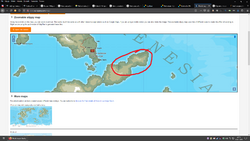Grenesia: Difference between revisions
No edit summary |
No edit summary |
||
| Line 128: | Line 128: | ||
WIP | WIP | ||
===Origin=== | ===Origin=== | ||
The earliest cases of human activity on Grenesian soil date back to 4th century BCE. Genetic and linguistic analysis show that both modern Grenesians and medieval rulers are related to Proto-Yasic tribes. Their first known settlements were primitive huts walled with wooden palisade, some surrounded by a moat or built on islands. The Yasic peoples on Marenesia dealt not only with hunting and gathering, but also they fished and cultivated land. warring tribes were eventually conquered and dominated by Grènèsi, or 'the tribe of fire' in late 5th century CE, although the first known historical mention of a ruler of Grenesia comes from year 1005, however neither of them mentions his name | The earliest cases of human activity on Grenesian soil date back to 4th century BCE. Genetic and linguistic analysis show that both modern Grenesians and medieval rulers are related to Proto-Yasic tribes. Their first known settlements were primitive huts walled with wooden palisade, some surrounded by a moat or built on islands. The Yasic peoples on Marenesia dealt not only with hunting and gathering, but also they fished and cultivated land. warring tribes were eventually conquered and dominated by Grènèsi, or 'the tribe of fire' in late 5th century CE, although the first known historical mention of a ruler of Grenesia comes from year 1005, however neither of them mentions his name. | ||
===[a cool name] dynasty=== | ===[a cool name] dynasty=== | ||
Following the supposed murder of Popiel III in 1289, his son was crowned by emperor[a badass name] and took the name Yarovit I. He attempted to strengthen the new official religion and built not only an archbishopric in Orligrod, but also many parishes, churches, and monasteries. However, under his rule nothing was done to eradicate pagan customs. | In 1285 CE duke Popiel III officially converted to Catholicism under pressures from [[Salvia]] in exchange for mutual truce between the Grenesian tribe the Imperium. According to 14th century chronicler Yan Kolbe, ''[...]the imperator himself supervised promotion of new faith. Many temples were built in Orligrod and houses of local belief are burned, deemed foul and impure''. Following the supposed murder of Popiel III in 1289, his son was crowned by emperor[a badass name] and took the name Yarovit I. He attempted to strengthen the new official religion and built not only an archbishopric in Orligrod, but also many parishes, churches, and monasteries. However, under his rule nothing was done to eradicate pagan customs. | ||
==Geography== | ==Geography== | ||
===Landscape=== | ===Landscape=== | ||
Revision as of 21:20, 15 February 2020
This article is incomplete because it is pending further input from participants, or it is a work-in-progress by one author. Please comment on this article's talk page to share your input, comments and questions. Note: To contribute to this article, you may need to seek help from the author(s) of this page. |
Commonwealth of Grenesia Ṗэчпосполита Ґрэнэска (Grenesian) Zhèchpospolita Grènèska | |
|---|---|
 Location of Grenesia (i want to be somewhere there :P) | |
 Map of Grenesia | |
| Capital | Karlitch |
| Official languages | Grenesian |
| Recognised regional languages | Izjrski |
| Ethnic groups | 98% Grenesian 2% others or not stated |
| Demonym(s) | Grenesian |
| Government | Direct democracy |
| Stefan Bielak | |
| Legislature | National Assembly |
| Senate | |
| Zyazd | |
| Area | |
• Total | 420 km2 (160 sq mi) |
• Water (%) | honestly idk give me a place on the map first ok |
| Population | |
• 2018 estimate | B L A N K |
• Density | 1/km2 (2.6/sq mi) |
| GDP (nominal) | 2017 estimate |
• Total | B L A N K |
• Per capita | B L A N K |
| Gini (2018) | 21.37 low |
| HDI (2018) | very high |
| Currency | Grenesian plat (GNP (пл)) |
| Time zone | UTC+4 |
| Date format | dd.mm.yyyy |
| Driving side | right |
| Calling code | +66 |
| Internet TLD | .gn; .гн |
Grenesia (Grenesian: Ґрэнэзъя, tr. Grènèzya [grɛnɛzja], officially the Commonwealth of Grenesia, is a country located in Marenesia. It is divided into 14 provinces, covering an area of [B L A N K] square kilometres ([B L A N K] sq mi), and has mostly mediterranean or humid continental climate. Grenesia's capital and largest city is Karlitch. Other major cities include Lubogoshch, Gervazno, Shadz’na, Lisitsè, S’vętokhvalki, Shrènitsa and Byala Gran’.
Etymology
The origin of the name "Grenesia" derives from the Yasic tribe of Grenesians (Grènèsi), who inhabited the Drva river basin of present-day Drvanski region starting in the mid-4th century BCE. The origin of the name Grènèsi itself is disputed, however many historians claim that it derives from the Proto-Yasic word gorěti (to burn).
History
WIP
Origin
The earliest cases of human activity on Grenesian soil date back to 4th century BCE. Genetic and linguistic analysis show that both modern Grenesians and medieval rulers are related to Proto-Yasic tribes. Their first known settlements were primitive huts walled with wooden palisade, some surrounded by a moat or built on islands. The Yasic peoples on Marenesia dealt not only with hunting and gathering, but also they fished and cultivated land. warring tribes were eventually conquered and dominated by Grènèsi, or 'the tribe of fire' in late 5th century CE, although the first known historical mention of a ruler of Grenesia comes from year 1005, however neither of them mentions his name.
[a cool name] dynasty
In 1285 CE duke Popiel III officially converted to Catholicism under pressures from Salvia in exchange for mutual truce between the Grenesian tribe the Imperium. According to 14th century chronicler Yan Kolbe, [...]the imperator himself supervised promotion of new faith. Many temples were built in Orligrod and houses of local belief are burned, deemed foul and impure. Following the supposed murder of Popiel III in 1289, his son was crowned by emperor[a badass name] and took the name Yarovit I. He attempted to strengthen the new official religion and built not only an archbishopric in Orligrod, but also many parishes, churches, and monasteries. However, under his rule nothing was done to eradicate pagan customs.
Geography
Landscape
Climate
Politics
Government
Political parties
Foreign relations
Military
Economy
Energy
Transport
Media
Demographics
Ethnic groups
Language
Religion
Health
Education
Culture
Literature
Visual arts
Music
Cuisine
Sport
References
This template may be deleted.

